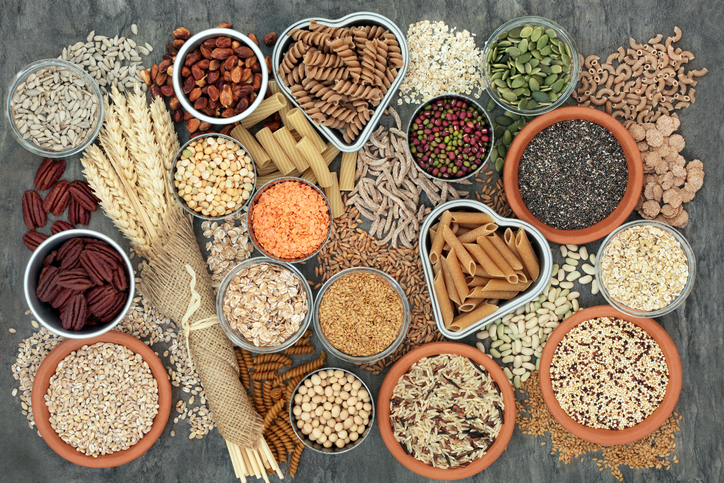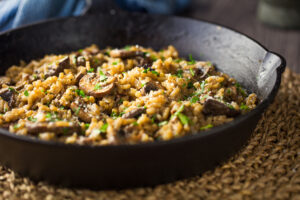This article appears in the March 7, 2019 issue of AICR’s eNews.
March is Colorectal Cancer Awareness Month and March 27th is Whole Grains Sampling Day, which is organized by the Whole Grains Council to highlight the variety of flavors and health benefits of whole grains. One such health benefit is reducing risk for colorectal cancer.
The AICR/WCRF Third Expert Report found strong evidence, for the first time, that eating 90 grams (about 3 ounces) of whole-grain foods daily reduces risk for colorectal cancer by 17 percent. Research also showed that eating greater amounts reduced risk even further.
Whole grains are one of AICR’s Foods That Fight Cancer™. Whole grains are a good source of fiber and magnesium and they provide some protein too. Several types of whole grains are good sources of manganese, thiamin, niacin, vitamin B-6 and/or selenium. Other substances in whole grains such as polyphenols and lignans have shown anti-cancer actions in lab studies.
How can you get the recommended amount of whole grains in your diet?
Dietitian’s Tip to Increase Fiber Intake
Beth and I both encourage improving our fiber intake for overall health. When our digestive systems are “moving along”; people just feel better. I am a big believer in having a bran cereal daily. That gives me about 1/3rd of the fiber I need daily. However, many people forget they have to drink more fluids also.
I encourage a minimum of 6 cups of fluid daily (including milks, juice, water and non-caffeine containing beverages but I always hope people consume 8-10 cups of fluid daily. Mary Beth.
Ask the Dietitian: Whole Grain Tips
AICR recommends including whole grains in most meals as one part of your healthy eating pattern to lower cancer risk. The latest AICR report cites strong evidence that eating whole grains daily reduces risk of colorectal cancer and eating more seems to reduce risk even further.
Recommendations for overall health also emphasize the need to eat more whole grains, with advice to choose them for at least half of all the grain products we eat each day.
Tips on how to boost daily consumption of whole grains.
The average American eats a little less than one whole-grain serving per day. Swap at least two whole-grain servings to replace more refined grains for healthier eating habits.
- Switch from cereals that are made with refined grains to whole-grain cereals such as shredded wheat, whole-wheat flakes and oatmeal.
- Instead of white bread for sandwiches or toast, choose whole-grain bread.
- Swap out white rice with brown rice (quick-cooking options are great way to save time).
- In casseroles or mixed dishes, instead of white rice or refined-grain pasta, try a cooked whole grain like bulgur, quinoa, millet, sorghum or farro. Although perhaps unfamiliar to many, diverse whole grain options are delicious, and a fun way to add variety beyond your usual choices.
- For burritos and wraps, choose whole-grain tortillas or other whole-grain flatbreads.
- Switch your go-to pizza order to a whole-wheat crust. Or get whole-grain pizza dough and make your own at home, where you can load it with lots of delicious vegetables and herbs.
- Choose toasted wedges of whole-wheat pita bread or whole-grain crackers to dip in hummus or vegetable-yogurt-bean dips.
Whole grains are more nutritious than refined grains not only because they offer more dietary fiber, but also more vitamin E, magnesium and selenium. In addition, whole grains provide plant compounds including Polyphemus that may help support antioxidant defenses and promote health in a variety of ways.
Looking for a great whole grain recipe? Try this one-pan pasta dish, recommended by our oncology dietitians. To learn more about nutrition services at the Helen G. Nassif Community Cancer Center, call us at (319) 558-4876 or click here.






